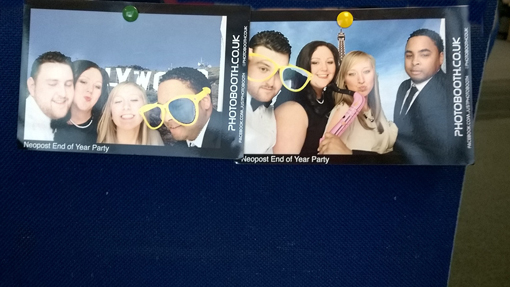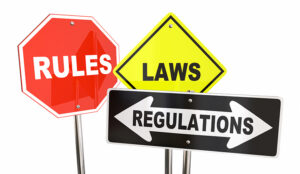Silly Contact Centre Rules
Want to improve employee engagement? A good first step would be to do away with the silly rules in your contact centre. Here are a few examples.
1. No pictures or personal stuff on desks

The vast majority of agents have a little picture of their family or friends (or in some cases, cars) on their desks, and what harm does it do?
It’s just a nice little way to remind yourself of what you cherish most in your life. It helps to raise a smile during a tough day.
The counter-argument
You could argue it looks unprofessional when guests or senior management pay a visit.
We think
Family photos are so common in call centres that few visitors would think it unprofessional. It’s more likely that their absence would indicate an office run with an excessively ironclad fist.
2. No eating at desks

This one’s pretty common. But why?
Most agents sit at their desks for two, three or four hours at a time – they’re going to get hungry.
So if they’ve got a minute or two of admin work to do after a call, why shouldn’t they chomp on a biscuit while they do it?
The counter-argument
Again, it can look unprofessional. Obviously, you don’t want agents chowing down on a full Sunday roast or chomping in their callers’ ears. So banning food at desks is probably easier than micromanaging when it is and isn’t acceptable.
We think
Trust your employees. You hired them, you trained them – can you not trust them to keep food in their desk drawers and only eat when it doesn’t affect their work?
3. Timed or monitored toilet breaks

This one comes down to a very simple question:
If you decide to bring out the stopwatch on agents’ bathroom breaks, are you really going to gain more in productivity than you lose in goodwill?
Making agents feel they can’t take toilet breaks, or that they have to rush them, is the type of thing that creates a toxic atmosphere of disgruntled employees.
The counter-argument
Toilet breaks are fundamentally open to exploitation from agents who just want to get off the phones for a few minutes. We even included it in our 7 most notorious tricks agents play.
We think
It’s a can of worms. And by opening it you stand to lose more than you gain.
Simple as that.
4. Agents not allowed to walk over to supervisors’ desks

This doesn’t sound like a place we’d like to work.
One of the most basic habits a good agent can have is: ‘if in doubt, check with a supervisor’. So putting rules in place to make that harder to do is surely going to have a negative effect.
The counter-argument
If you’ve got a lot of agents reporting to one supervisor then it’s possible you can get a queue forming around one desk – making that supervisor’s day feel a bit like a zombie movie. Phoning could be marginally quicker than walking over.
We think
Always have a supervisor walking the floor.
Done.
5. No mobile phone use during work hours

Probably the most hotly debated and most regularly flouted rule of the contact centre.
Here’s why it’s a silly rule:
Some agents (often parents with young children) simply will not be separated from their mobile phones. Regardless.
You can shout at them, discipline them, but all they’ll do is find more discreet ways to use their phones at their desks. In the case of some parents, nothing you can do will outweigh their need to be 100% contactable to their child – which is totally understandable.
It’s another fight that’s not worth starting.
[There are a variety of opinions on this matter. You can read them in Should Call Centre Agents Use Mobile Phones at Work?]
The counter-argument
Using personal mobiles at work is unprofessional. Absolutely. And if you’re tapping away on your mobile then, frankly, you’re not doing your job.
A number of contact centres will also claim that it breaches PCI compliance.
We think

Matt Phil Carver
There’s no point setting a blanket rule that’s exhausting to police and that some agents will break no matter how strongly you enforce it. So we suggest a compromise: mobiles can be checked, periodically, between calls. The occasional quick text reply is allowed, as long as that agent is meeting all their performance targets.
It’s not a perfect solution, but if you declare absolute war on mobiles in the call centre, you’ll waste a lot of time and energy on something that’s ultimately futile.
Do you have any of these rules in your contact centre?
With thanks to Matt Phil Carver – a regular contributor to Call Centre Helper.
Author: Megan Jones

22 Comments
-
Call me old fashioned but when you’re at work you’re there to work. It’s not something that is there to pay you a wage whilst you do all you can to ‘not work’. Mobile phones DO NOT need to be checked or out of your bag or pocket. If you have young children then the school or childminder should have your work number to call you in emergencies or you can make calls/texts in your lunch break.
Tibby
5 Mar at 12:54
-
Great article, these are definitely rules that are too restrictive that should be loosened. No matter what role people are in they appreciate having allowances for the personal life interrupting their professional life.
Anna Byrne
5 Mar at 13:07
-
A silly contact centre rule/KPA is chasing down the elusive NPS or Csat score. Taking your call centre down a single number is stupendous with so many factors out of your control…..
Jethro Katz
5 Mar at 13:10
-
I agree with the approach and of course trusting employees is paramount to effective working relations. The only concern on mobile phones is the ability to enter customer information i.e. credit card numbers etc. whilst working. In order to ensure POPI/PCI practice, suggest cell phones checked during breaks away from workstations.
Jackie Naughton
5 Mar at 13:32
-
I agree with Tibby. Unfortunately, people have a hard time making proper decisions about mobile phone use. You see it in check out lanes, in traffic, etc. It is no different at the work place. The logic that because people choose to bend or break rules and they are difficult to enforce, mans that we should eliminate them, seems a bit silly. You have to pick and chose your battles, that is true, but you do go to work to work, and part of the work environment is respecting the policies and procedures set forth by management. Would these rules really exists if people consistently made good choices without guidance?
MWB
5 Mar at 14:14
-
We have tried to ban mobiles with great difficulty! Social media and gossip is the main issue. The team pick something up on Facebook and then waste time sharing and discussing it. Trying to monitor it is a constant battle.
Andy Kennedy
5 Mar at 14:16
-
Sorry – but I have to disagree that a number of these rules are ‘silly’:
Eating at your desk (aside from chewing down the phone) creates more disenchantment from the other employees who ‘hot-desk’ at those stations and then have to spend time cleaning crumbs, grease and all sorts of food remnants that they do not wish to sit on for 8 hours or touch.
Not allowing mobile phones in a contact centre where you are taking guest credit card details and other personal data is not silly either. We would not call a ban on texting and driving silly – even though many flout that particular law.
An allowance of time for toilet ‘comfort’ breaks is not silly either – when you consider paid breaks are also provided for employees and resource planning and forecasts are based on having a phones staffed to maintain service levels.
MAW
5 Mar at 14:43
-
I am with MAW on the mobile phone use, all modern phones have a camera this is a data protection issue as simple as that.
SFJ
5 Mar at 16:04
-
I think we have to be very careful about having mobile phones in work areas. There are very few phones now that don’t have social media platforms and it is very easy to take snapshots of things which may be innocent at the time but once out there can be manipulated by other with alteria motives. I do think that agents should be able to move away from their desk to take a call that may be urgent. We need to ensure full DPA is taken into account before making decisions and its always best to be safe that sorry as impacts can be massive.
Teresa Pinchers
5 Mar at 17:15
-
The acknowledgement from some, regarding these rules, indicates there is still a long way to go before call center employment is up to par with many other ‘white-collar’ jobs. Draconian measures, rather than training, monitoring and holding people accountable, is still an accepted “management” practice for some. Get with the program people! You make call centers and those who manage them, look bad when you support these kinds of rules, rather than addressing the root causes and finding solutions agreeable to all. In other words, do your job and manage, not rule.
John Lockwood
5 Mar at 21:16
-
For me, there is no “silly rule” regarding mobile phones, the rule has to be “no”.
The mobile phone ultimately is a storage unit nowadays, and within seconds, innocently or otherwise, crucial customer data can be captured and place any business at massive risk.
At a time when social media rules, placing more power into the hands of the consumer, the risk is too great of customer data falling into the wrong hands and breaching data protection regulations.
On the eating at desk piece, my feeling is that if breaks are assigned correctly according to contractual hours, and expectation is communicated effectively, it should never be an issue….comfortable, clean and vibrant breakout areas certainly help!!!
PG
5 Mar at 21:54
-
Most of these rules are silly – we need to change with the times – the reality is that if you recruit and manage correctly you can empower your agents to make decisions themselves – it is always the team members disadvantaged – managers eat at their desk use mobiles ect…. with no additional security checks – the real issue here is you don’t trust your staff!!!
Stephen Elliott
6 Mar at 13:57
-
I’m sorry but I don’t find these rules petty at all with the exception of tined toilet breaks. If I’m paying someone to work that’s what I expect not messing around with their mobiles.
As for not going to supervisors desks we simply have a messaging system setup on PC’s which alerts the team leader instantly so he can go directly to them, problem solved.
Andy Graham
7 Mar at 00:28
-
I actually started laughing when I read these silly rules. I worked as an agent in 2 large call centers that upheld the silliness mentioned in the article. That’s why I now manage and direct the operations of a call center and it’s much different. The agents are productive, knowledgeable and call stats are hitting benchmarks and goals. Why? Because the agents are treated as people, as a company asset and not as robots. Complaints from customers are not because a break is too long, or there are pictures on an agents desk, etc. The complaints are due to company product or service issues or a lapse in a organizational process. Thanks for giving me a laugh this morning of how crazy it can be for agents in a call center. When you find a center that focuses on an agents skill, knowledge and career aspirations, you’ll find a center that is flourishing with good stats, skilled agents and happy customers.
Gail Smith
7 Mar at 16:23
-
Very interesting article.
To the people stating these are silly rules and you should focus on agents skill and empower them to make good choices… my challenge to that would be you require standards (rules) for people to know what good looks like… otherwise nobody knows what to do and what not to do.
Very successful teams have ground rules, I think the key is transparency, everybody (customer facing people thru to contact centre manager) agree to the rules and strive to abide by them and that the rules are created across all levels of the contact centre.
Chris
8 Mar at 11:24
-
I think that in a competitive environment your team needs to be fully dedicated and trained to provide the best quality service possible. In a call center you need to have people concentrated in their calls and their customers, and furthermore, because of the KPIs that are requested we cannot deviate from that concentration.
When you are hired to work in a call centeras an agent you know that’s the environment, you know you need those silly rules ( with the exception of the photographs).
Eating, cell phones, and restroom times are rules needed to protect and guarantee our service level indicators.
The important thing here is to have and create within your agents and team other activities that would compensate for the silly rules.
Of course there will always be agents that would try to challenge your rules but if we didn’t have rules and policies honestly, I truly believe, that your office would be a total disaster.
Liza Parrilla
28 Mar at 11:15
-
I completely understand that mobiles are an issue related to data privacy. However, for me, it is also a constant safety concern. Being from the states, we know the danger of some loon “going postal”. I refuse to be separated from my means of personal communication. I will happily leave it silenced and in my pocket when not on breaks, but it WILL be on my person. Call centers in the states are notorious for driving CSR’s to depressive fits and worse. Timed bathroom breaks, you say? I have worked in an office where I actually had to raise my hand for permission to go. I have worked in an office where I was not allowed to disconnect a call on a customer who was loudly masturbating (or at least pretended to) during the call as I read him the required policy. This was in-bound tech support… Not a sales pitch. People lose their marbles in these centers frequently.
AmyJo
13 Sep at 22:29
-
I work for a call center that enforces a no mobile phones policy, and clear desk policy citing ofcom rules as the reason. This not only means no phones, but no books, paper or writing implements. My department regularly has wait times of 30+ minutes between calls on a morning and even longer during the evening shift. Essentially we’re forced to stair at blank screens until our next call comes through. It’s draconian.
Jim
10 Jan at 23:48
-
Very interesting article & debatable topic indeed! I feel, requirement of call centre’s rigid rules & dictatorship is totally dependent on several other factors like physical location of the centre, type / class of employees hired as agents and their psychology/attitudes towards work , process and client’s requirement, job role etc.
I run a micro-sized contact centre in India and hire undergraduates or college students who seek for easy pocket money and go casual about everything in life. You can’t except them to understand, analyse or implement Non-disclosure agreement / best HR practices/CSAT ratios etc, no matter how hard you train them! So, in my case, measures to limit their certain liberty at work is mandatory to tame them and curve out unnecessary hassles and losses. I think the old fashioned contact centre culture of “Work Hard & Party Harder” still rocks for those centres where you have no option other than working with a bunch of restless young students!
But obviously, if you are lucky enough to form a robust team of matured workers, you don’t need to be hard on rules and can easily call the traditional culture as ‘silly’!
Bottom line is to create a balance between limitations & scopes of your Centre’s work culture and constantly upgrade Employee Rewards & recognition programs keeping good provisions to compensate their hard work and keep them motivated. That’s all to stay cool & keep going 🙂
Subhasree
25 May at 23:21
-
If credit card information being captured is a concern – then why is this information still being displayed in an insecure fashion? Call centres that care about customer credit card information never have agents being able to display or have to hear or type this information. When a customer credit card details are required they should be able to press a button and the caller is temporarily transferred to an automated system that asks the customer to key in the credit card details into their phone keypad. When complete the caller is transferred back to the agent.
Albert
5 Jun at 11:27
-
What happens if an employee goes to the toilet and spends 10 minutes in the toilet, prior to their lunch break.. and still takes their full lunch break?
Avisha
24 Mar at 14:57
-
It all depends upon the employer, but typically, if they don’t come back to their desk, this would normally be treated as part of their lunch break.
Jonty Pearce
4 Apr at 16:43
Get the latest call centre and BPO reports, specialist whitepapers and interesting case-studies.











































Call me old fashioned but when you’re at work you’re there to work. It’s not something that is there to pay you a wage whilst you do all you can to ‘not work’. Mobile phones DO NOT need to be checked or out of your bag or pocket. If you have young children then the school or childminder should have your work number to call you in emergencies or you can make calls/texts in your lunch break.
Great article, these are definitely rules that are too restrictive that should be loosened. No matter what role people are in they appreciate having allowances for the personal life interrupting their professional life.
A silly contact centre rule/KPA is chasing down the elusive NPS or Csat score. Taking your call centre down a single number is stupendous with so many factors out of your control…..
I agree with the approach and of course trusting employees is paramount to effective working relations. The only concern on mobile phones is the ability to enter customer information i.e. credit card numbers etc. whilst working. In order to ensure POPI/PCI practice, suggest cell phones checked during breaks away from workstations.
I agree with Tibby. Unfortunately, people have a hard time making proper decisions about mobile phone use. You see it in check out lanes, in traffic, etc. It is no different at the work place. The logic that because people choose to bend or break rules and they are difficult to enforce, mans that we should eliminate them, seems a bit silly. You have to pick and chose your battles, that is true, but you do go to work to work, and part of the work environment is respecting the policies and procedures set forth by management. Would these rules really exists if people consistently made good choices without guidance?
We have tried to ban mobiles with great difficulty! Social media and gossip is the main issue. The team pick something up on Facebook and then waste time sharing and discussing it. Trying to monitor it is a constant battle.
Sorry – but I have to disagree that a number of these rules are ‘silly’:
Eating at your desk (aside from chewing down the phone) creates more disenchantment from the other employees who ‘hot-desk’ at those stations and then have to spend time cleaning crumbs, grease and all sorts of food remnants that they do not wish to sit on for 8 hours or touch.
Not allowing mobile phones in a contact centre where you are taking guest credit card details and other personal data is not silly either. We would not call a ban on texting and driving silly – even though many flout that particular law.
An allowance of time for toilet ‘comfort’ breaks is not silly either – when you consider paid breaks are also provided for employees and resource planning and forecasts are based on having a phones staffed to maintain service levels.
I am with MAW on the mobile phone use, all modern phones have a camera this is a data protection issue as simple as that.
I think we have to be very careful about having mobile phones in work areas. There are very few phones now that don’t have social media platforms and it is very easy to take snapshots of things which may be innocent at the time but once out there can be manipulated by other with alteria motives. I do think that agents should be able to move away from their desk to take a call that may be urgent. We need to ensure full DPA is taken into account before making decisions and its always best to be safe that sorry as impacts can be massive.
The acknowledgement from some, regarding these rules, indicates there is still a long way to go before call center employment is up to par with many other ‘white-collar’ jobs. Draconian measures, rather than training, monitoring and holding people accountable, is still an accepted “management” practice for some. Get with the program people! You make call centers and those who manage them, look bad when you support these kinds of rules, rather than addressing the root causes and finding solutions agreeable to all. In other words, do your job and manage, not rule.
For me, there is no “silly rule” regarding mobile phones, the rule has to be “no”.
The mobile phone ultimately is a storage unit nowadays, and within seconds, innocently or otherwise, crucial customer data can be captured and place any business at massive risk.
At a time when social media rules, placing more power into the hands of the consumer, the risk is too great of customer data falling into the wrong hands and breaching data protection regulations.
On the eating at desk piece, my feeling is that if breaks are assigned correctly according to contractual hours, and expectation is communicated effectively, it should never be an issue….comfortable, clean and vibrant breakout areas certainly help!!!
Most of these rules are silly – we need to change with the times – the reality is that if you recruit and manage correctly you can empower your agents to make decisions themselves – it is always the team members disadvantaged – managers eat at their desk use mobiles ect…. with no additional security checks – the real issue here is you don’t trust your staff!!!
I’m sorry but I don’t find these rules petty at all with the exception of tined toilet breaks. If I’m paying someone to work that’s what I expect not messing around with their mobiles.
As for not going to supervisors desks we simply have a messaging system setup on PC’s which alerts the team leader instantly so he can go directly to them, problem solved.
I actually started laughing when I read these silly rules. I worked as an agent in 2 large call centers that upheld the silliness mentioned in the article. That’s why I now manage and direct the operations of a call center and it’s much different. The agents are productive, knowledgeable and call stats are hitting benchmarks and goals. Why? Because the agents are treated as people, as a company asset and not as robots. Complaints from customers are not because a break is too long, or there are pictures on an agents desk, etc. The complaints are due to company product or service issues or a lapse in a organizational process. Thanks for giving me a laugh this morning of how crazy it can be for agents in a call center. When you find a center that focuses on an agents skill, knowledge and career aspirations, you’ll find a center that is flourishing with good stats, skilled agents and happy customers.
Very interesting article.
To the people stating these are silly rules and you should focus on agents skill and empower them to make good choices… my challenge to that would be you require standards (rules) for people to know what good looks like… otherwise nobody knows what to do and what not to do.
Very successful teams have ground rules, I think the key is transparency, everybody (customer facing people thru to contact centre manager) agree to the rules and strive to abide by them and that the rules are created across all levels of the contact centre.
I think that in a competitive environment your team needs to be fully dedicated and trained to provide the best quality service possible. In a call center you need to have people concentrated in their calls and their customers, and furthermore, because of the KPIs that are requested we cannot deviate from that concentration.
When you are hired to work in a call centeras an agent you know that’s the environment, you know you need those silly rules ( with the exception of the photographs).
Eating, cell phones, and restroom times are rules needed to protect and guarantee our service level indicators.
The important thing here is to have and create within your agents and team other activities that would compensate for the silly rules.
Of course there will always be agents that would try to challenge your rules but if we didn’t have rules and policies honestly, I truly believe, that your office would be a total disaster.
I completely understand that mobiles are an issue related to data privacy. However, for me, it is also a constant safety concern. Being from the states, we know the danger of some loon “going postal”. I refuse to be separated from my means of personal communication. I will happily leave it silenced and in my pocket when not on breaks, but it WILL be on my person. Call centers in the states are notorious for driving CSR’s to depressive fits and worse. Timed bathroom breaks, you say? I have worked in an office where I actually had to raise my hand for permission to go. I have worked in an office where I was not allowed to disconnect a call on a customer who was loudly masturbating (or at least pretended to) during the call as I read him the required policy. This was in-bound tech support… Not a sales pitch. People lose their marbles in these centers frequently.
I work for a call center that enforces a no mobile phones policy, and clear desk policy citing ofcom rules as the reason. This not only means no phones, but no books, paper or writing implements. My department regularly has wait times of 30+ minutes between calls on a morning and even longer during the evening shift. Essentially we’re forced to stair at blank screens until our next call comes through. It’s draconian.
Very interesting article & debatable topic indeed! I feel, requirement of call centre’s rigid rules & dictatorship is totally dependent on several other factors like physical location of the centre, type / class of employees hired as agents and their psychology/attitudes towards work , process and client’s requirement, job role etc.
I run a micro-sized contact centre in India and hire undergraduates or college students who seek for easy pocket money and go casual about everything in life. You can’t except them to understand, analyse or implement Non-disclosure agreement / best HR practices/CSAT ratios etc, no matter how hard you train them! So, in my case, measures to limit their certain liberty at work is mandatory to tame them and curve out unnecessary hassles and losses. I think the old fashioned contact centre culture of “Work Hard & Party Harder” still rocks for those centres where you have no option other than working with a bunch of restless young students!
But obviously, if you are lucky enough to form a robust team of matured workers, you don’t need to be hard on rules and can easily call the traditional culture as ‘silly’!
Bottom line is to create a balance between limitations & scopes of your Centre’s work culture and constantly upgrade Employee Rewards & recognition programs keeping good provisions to compensate their hard work and keep them motivated. That’s all to stay cool & keep going 🙂
If credit card information being captured is a concern – then why is this information still being displayed in an insecure fashion? Call centres that care about customer credit card information never have agents being able to display or have to hear or type this information. When a customer credit card details are required they should be able to press a button and the caller is temporarily transferred to an automated system that asks the customer to key in the credit card details into their phone keypad. When complete the caller is transferred back to the agent.
What happens if an employee goes to the toilet and spends 10 minutes in the toilet, prior to their lunch break.. and still takes their full lunch break?
It all depends upon the employer, but typically, if they don’t come back to their desk, this would normally be treated as part of their lunch break.